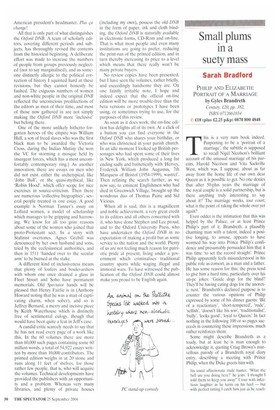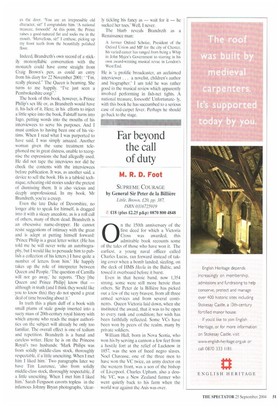Small plums in a suety mass
Sarah Bradford
PHILIP AND ELIZABETH: PORTRAIT OF A MARRIAGE by Gyles Brandreth Century, £20, pp. 382, ISBN 0712661034 co /18 (plus 12.25 p&p) 0870 800 4848
his is a very rum book indeed. Purporting to be a 'portrait of a marriage', the subtitle is supposed to recall Nigel Nicolson's brilliant account of the unusual marriage of his parents, Harold Nicolson and Vita Sackville West, which was, I suppose, about as far away from the home life of our own dear Queen as it is possible to get. No one denies that after 50-plus years the marriage of the royal couple is a solid partnership, but is there anything truly interesting to say about it? The marriage works, tout court; what is the point of raking the whole over yet again?
Even odder is the intimation that this was helped by the Palace, or at least Prince Philip's part of it. Brandreth, a plausibly charming man with a talent, indeed a positive longing, to amuse, appears to have wormed his way into Prince Philip's confidence and presumably persuaded him that it was time 'to set the record straight'. Prince Philip apparently feels misunderstood in his public role as consort, as a man and a father. He has some reason for this: the press tend to give him a hard time, particularly over his un-pc jokes: 'Guide dogs for the blind? They'll be having eating dogs for the anorexic next.' Brandreth's declared purpose is to counter the various opinions of Philip expressed by some of his dinner guests: 'Bit of a reactionary', 'short-tempered', 'rude', 'selfish', 'doesn't like his son', 'traditionalist', 'bully', 'looks good', 'loyal to Queen.' In fact nothing in the following 100 or so pages succeeds in countering these impressions, much rather reinforces them.
Some might describe Brandreth as a toady, but at least he is man enough to acknowledge it, quoting Criag Brown's marvellous parody of a Brandreth royal diary entry, describing a meeting with Prince Philip, when the Duke greets him with
his usual affectionate male banter. 'What the hell are you doing here?' he jests. 'I thought I told them to keep you away!' I roar with infectious laughter as he turns on his heel — but with perfect timing I catch him just as he reach es the door. 'You are an irrepressible old character, sir!' I congratulate him. 'A national treasure, forsooth!' At this point, the Prince raises a good-natured fist and socks me in the mouth. 'Marvellous, sir!' I enthuse, picking up my front teeth from the beautifully polished floor.
Indeed, Brandreth's own record of a stickily monosyllabic conversation with the monarch could have come straight from Craig Brown's pen, as could an entry from his diary for 22 November 2001: ' "I'm, really pleased." The Queen is beaming. She turns to me happily. "I've just seen a Pembrokeshire corgi": The hook of this book, however, is Prince Philip's sex life or, as Brandreth would have it, his lack of it, Here, in his efforts to inject a little spice into the book, Falstaff turns into Iago, putting words into the mouths of his interviewees to serve his purposes. And I must confess to having been one of his victims. When I read what I was purported to have said, I was simply amazed. Another woman given the same treatment telephoned me in great distress, unable to recognise the expressions she had allegedly used. He did not tape the interviews nor did he check the contents with the interviewees before publication. It was, as another said, a device to sell the book. His is a tabloid technique, reheating old stories under the pretext of dismissing them. It is also vicious and deeply unprofessional. In my book. Mr Brandreth, you're a creep.
Even the late Duke of Devonshire, no longer able to speak for himself, is dragged into it with a sleazy anecdote, as is a roll call of others, many of them dead. Brandreth is an obesessive name-dropper. He cannot resist suggestions of intimacy with the great and is adept at putting himself forward: 'Prince Philip is a great letter writer. (He has told me he will never write an autobiography, but I would like to persuade him to publish a collection of his letters.) I have quite a number of letters from him.' He happily takes up the role of interpreter between Queen and People. 'The question of Camilla will not go away,' he reports. 'They [the Queen and Prince Philip] know that — although in truth (and I think they would like you to know this) they do not spend a great deal of time brooding about it.'
In truth this a plum duff of a book with small plums of stale gossip inserted into a suety mass of 20th-century royal history with which anyone who reads the major authorities on the subject will already be only too familiar. The overall effect is one of tedium and repetition. Brandreth is a banal and careless writer. Here he is on the Princess Royal's two husbands: 'Mark Philips was from solidly middle-class stock, thoroughly respectable, if a little unexciting. When I met him I liked him.' Two paragraphs later we have Tim Laurence, 'also from solidly middle-class stock, thoroughly respectable, if a little unexciting. When I met him I liked him.' Sarah Ferguson cavorts topless in the infamous Johnny Bryan photographs, 'clear ly tickling his fancy as — wait for it — he sucked her toes.' Well, I never.
The blurb reveals Brandreth as a Renaissance man:
A former Oxford Scholar, President of the Oxford Union and MP for the city of Chester, his varied career has ranged from being a Whip in John Major's Government to starring in his own award-winning musical revue in London's West End.
He is 'a prolific broadcaster, an acclaimed interviewer . . . a novelist, children's author and biographer.' I am told he was rather good in the musical review which apparently involved performing in fish-net tights. A national treasure, forsooth! Unfortunately, with this book he has succumbed to a serious case of red-carpet fever. Perhaps he should go back to the stage.



























































































 Previous page
Previous page